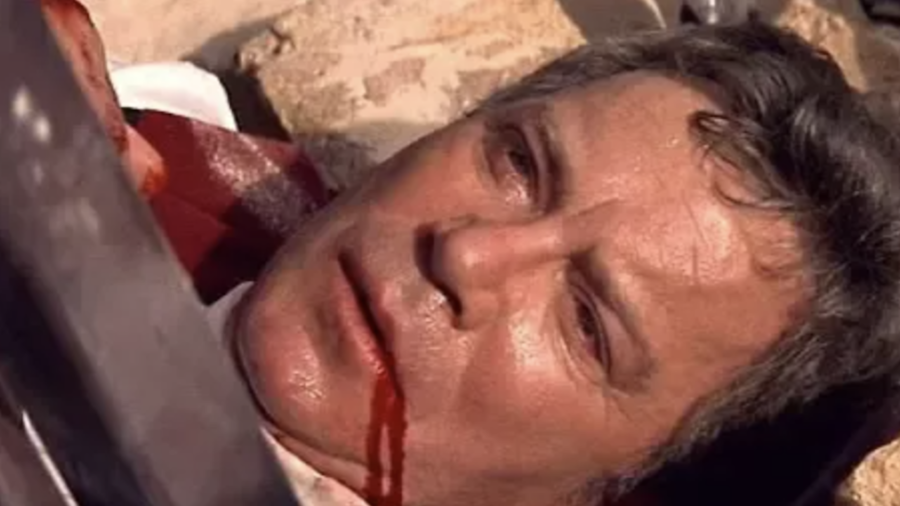Ronald D. Moore Wanted To Kill Captain Kirk In Star Trek: Generations

Star Trek: Generations definitely wasn’t the franchise’s finest hour, but it did have the major selling point of getting to see Kirk share an adventure with the Next Generation crew. Unfortunately for Kirk, that adventure ended with his death after he got a freaking bridge dropped on him.
One of the two men responsible for writing that death scene was Ronald D. Moore, who went on to bring us the Battlestar Galactica reboot and Starz’s Outlander adaptation. In a new interview with Collider, Moore shares his thoughts about what it was like to be tasked with killing off a character he’d grown up idolizing.
Moore told Collider about killing William Shatner’s Captain Kirk in Star Trek: Generations.
It was difficult, and yet I was very eager to do it. It was a really odd thing. I really wanted to do that story. I really wanted to write the death of Captain Kirk. I really wanted to do it in the movie. I remember writing the scene with Brannon [Braga], my writing partner, at the time.
When I said, ‘And Kirk dies,’ I wept. It was very emotional and very strange, in the moment and all the way through the process. I’d read it in the script and I’d always be struck by what I’d just done and what we were doing, and that this was my childhood hero and I was writing his death. Even then, I didn’t quite know what to make of it.
I was mystified by why I was doing it, why I was so driven to do it, and why it was affecting me like it was. I still don’t know what it means. It’s a strange singular experience. I don’t even know anyone to talk to about it because I don’t know anyone who’s had that experience.
Penning Star Trek: Generations — and killing off Kirk — must have been a surreal climax of a career that began with Moore submitting a spec script to the Trek producers back in the Next Gen era. There are plenty of other writers who did the same, only to have nothing come of it.
But for Moore, that script set him on a path that saw him write dozens of Trek episodes across Next Gen, Deep Space Nine, and Voyager, as well as co-writing Generations and First Contact with Brannon Braga. But Moore says he was genuinely confident that his Trek submission would get him the job…even if that belief was couched solely in the arrogance of a 23-year-old. Moore said:
Looking back on it now, I’m like, ‘God, you were just full of hubris. What the hell was wrong with you?!’ But at the time, I totally believed it. I was like, ‘I’m gonna sell this, they’re gonna make it, and they’re gonna bring me on this show.’
I remember walking through the building where all the writers were at Paramount while I was on the tour, and we walked by this tiny little office. It was literally the size of a closet, next to the stairwell. As we passed by that office, Richard Arnold, who was giving me the set tour and was instrumental to that whole story, he said, ‘One of the writers used to work in there, and they just left.’
I remember looking in that office and going, ‘I’m gonna be in that office someday.’ And you know what? I was. But, it’s hard to even tell that story because it’s so ridiculously arrogant for a 23-year-old. That was the attitude I had. I completely believed that I was gonna sell it, it was gonna happen, and I was gonna do it. Some miracle of the gods actually decided to make it happen.
In addition to successes like Battlestar Galactica and Outlander, Moore’s post-Trek career has its share of non-starters. One of the more tragic of those was an adaptation of Anne McCaffrey’s Dragonriders of Pern series for what was then The WB (which later merged with Paramount’s UPN to become The CW).
That project got to within a few days of shooting the pilot episode when the network requested extensive changes to the script. Those changes were so significant that Moore felt it no longer honored the source material, so Moore drew a line in the sand and the project died.
Looking back on the Pern experience, Moore said:
I think the Pern experience was very important for me because it told me that, as bad as I wanted to do something, there was a point that I would walk away, and I carry that with me. It gives you a sense of confidence. Now I know that if I’m in a fight or a big argument with executives or the studio or whoever, and it’s getting to a point where it’s starting to get bad, I don’t have to have the fear of, ‘Am I strong enough to see this through?
Would I really make a stand here? Would I really quit over this issue?’ And I know in my heart that there is a place where I would walk away. I don’t have to make it about my ego. I don’t have to make it about whether I’m being strong enough or tough enough. I just feel like, ‘All right, I’ve done that. I’ve proven my point.’
I can walk away, at a certain point, when things get out of hand, and I don’t have to worry about that.












